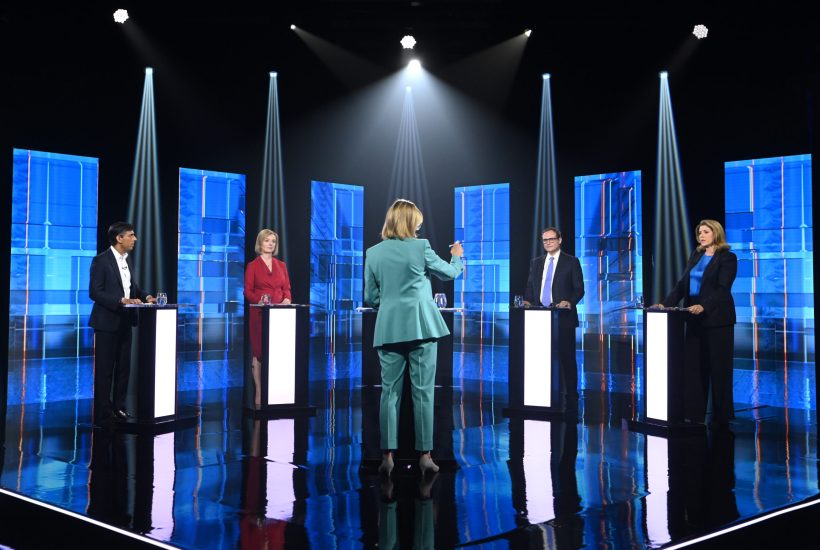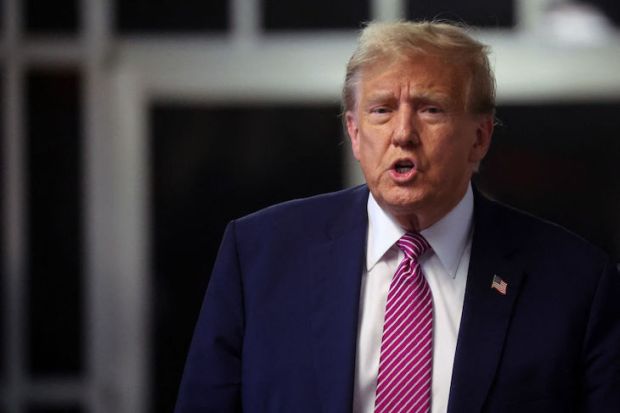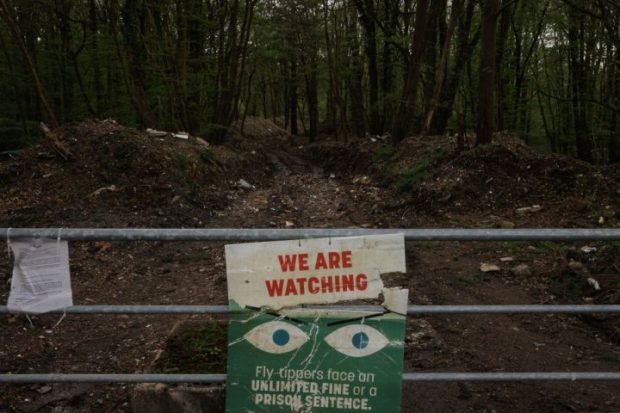The eyes had it, in last night’s leadership debate. Penny Mordaunt and Rishi Sunak took turns directing to the camera a puppy-eyed gaze. Tom Tugendhat blinked manfully, as if overcome from time to time with a sense of his humble desire to serve. Kemi Badenoch blinked, too – but more in the way of someone regretting the decision to switch her specs out for contact lenses. And if Liz Truss – an apprentice of Mrs Thatcher’s gimlet-eyed stare – blinked at all, I confess I didn’t notice it.
I was distracted by the fact that she seemed to have four eyebrows rather than the usual human ration of two. I suppose she had decided she’d look more statesmanlike by drawing them on higher up her brow, but failed to completely erase her original, homegrown eyebrows. They sat rebukingly below the new ones, faint traces, like an objective correlative of the Liberal Democrat past that her rival candidates would insist on reminding her of.
Anyway the whole thing was grim. Every candidate pushed their ethos appeal in the cheesiest way possible. Kemi reminded us with her first breath that she used to flip burgers and clean toilets. Tom Tugendhat – did he mention it? – had served in the army. Penny Mordaunt sounded jolly cross that anyone could accuse her of being ‘out of touch’, when all she was interested in was ‘the people at home’. Rishi was ‘incredibly proud’ of everything from having billionaire in-laws to having supported Brexit (against, he wanted us to know, quite some pressure). And Liz Truss was ‘brought up in Yorkshire’: ‘I say what I mean and I mean what I say.’
Every candidate insisted, at some point or another, that they intended to get rid of the old, toxic politics of a few weeks ago and that – unlike some of the other contenders they could mention – they were determined to run a positive, honest, unifying campaign looking to the future, not the past. But then they couldn’t help mentioning that one or other of their rivals had failed to resign, or had resigned irresponsibly, or hadn’t the experience to be leader because they hadn’t had anything to resign from.
Liz said that all the poisonous briefings about rivals emanating from her campaign were nothing to do with her (‘are you leading your campaign, Liz?’ wondered Kemi). Rishi, having obviously been told to look like less of a wishy-washy centrist lest the nutters on the right vote for Liz Truss, denounced his rivals’ plans for uncosted tax cuts as ‘socialism’ and derided one of Penny Mordaunt’s plans with the words ‘even Jeremy Corbyn didn’t go that far’. At once he was the only true-blue Tory in a room full of borderline Bolsheviks. Job done! Kemi Badenoch taunted Tom Tugendhat about his not having had a job in government while ‘we have been on the front line’. ‘I’ve been on the front line!’ he squeaked. Did he mention he was in the army? He’s still fighting, evidently, in the war against metaphor.
On only two things were the candidates resolutely united. None of them would have that skunk Johnson in their cabinet (though naturally those who’d been near the scene of the crime were very proud of how they’d been personally responsible for the good things he did); and none of them fancied putting their new premiership to the test of a general election any time before they absolutely had to (a matter of duty, you see, and ‘delivering’ on the manifesto promises). All but one of the candidates were united in another matter – which was the warm, spontaneous and unfeigned laughter that greeted Penny Mordaunt saying: ‘Polling shows that I’m the only one who can beat Keir Starmer.’
What was it all about? It certainly wasn’t about them. Penny Mordaunt seemed very much to regret that it was a leadership debate at all. If she had her way the conversation would not feature leadership candidates, but would all be about us, the ordinary hardworking people at home, who aren’t interested in this sort of thing anyway. After all, what she called her ‘legendary campaign video’ hadn’t featured her at all – which was a sign of how she intended to govern.
Did she have an economic plan? ‘This is not the place,’ she sniffed. ‘The poor viewers,’ she cooed at one point. ‘This must be very peculiar for the people sat at home,’ she cooed at another. People bringing up her porky-pies about trans rights, she said with high-minded regret, was ‘unedifying’. ‘If you’re still watching this debate,’ she said in her closing statement, ‘well done…’ Wouldn’t it all have been much better – much better for the ordinary hardworking people of this country – had ITV simply filmed an empty stage, which the commonsensical people at home could decline to watch as is their right as freeborn Britons? There’s something to that notion.
Those closing statements were just as awkward as you’d imagine. Rishi, over-rehearsed, delivered a smooth and forgettable pitch for leadership right down the camera (‘parents worked hard to give me the opportunity’, I have children etc). Penny, thrillingly, appeared for a moment to have dried up altogether – before the autocue in her brain kicked in and she read out what it said. Liz, somewhat boldly, read her closing speech off a bit of A4, eyes flicking down to the table as she said something about Britain’s best days lying ahead and unleashing the potential of our great country. Tom agreed with Penny that ‘it’s been about you’, said for the umpteenth time that ‘we need a clean start’ and reminded us that he’d been in the army: ‘I’m ready to serve. I’m ready to lead.’
Kemi, who also told us she has children, is doing this ‘not for myself, but for the future.’ She described the UK as a ‘beacon of shining light’ – conjuring in many minds the image of a collapsing star, a fire in a magnesium storage unit or a meltdown in a nuclear reactor. ‘That’s why so many people want to come here, and we need to make sure…’ There was a moment when I thought she might continue ‘…that they go to Rwanda instead’ – but I’m sad to say she swerved following through on the idea.
To give credit where it’s due, Kemi offered the most relatable line of the night. When she worked in the Treasury, she said, sometimes you were faced with a decision where there was no obvious right thing to do: would you choose ‘difficult option A, terrible option B, or mad option C’? The frontrunners, as things stand, are said to be Sunak, Mordaunt and Truss. I say no more than that.
Got something to add? Join the discussion and comment below.
Get 10 issues for just $10
Subscribe to The Spectator Australia today for the next 10 magazine issues, plus full online access, for just $10.





















Comments
Don't miss out
Join the conversation with other Spectator Australia readers. Subscribe to leave a comment.
SUBSCRIBEAlready a subscriber? Log in